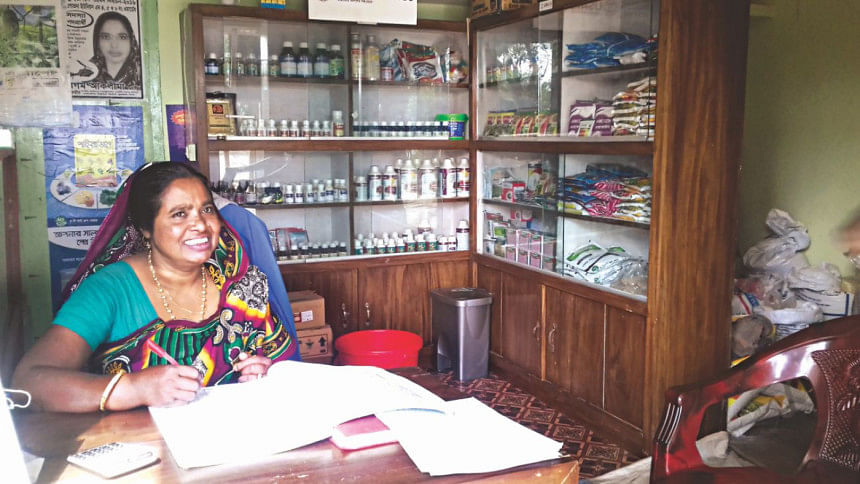Day labourer turns successful retailer

Malmolia village in Khulna's Dumuria upazila is remote. Thirty-five kilometres from the city, it doesn't have sealed roads or grid electricity. What it does have is a well-stocked shop selling agricultural supplies. The brainchild of an unlikely entrepreneur, the shop harbours a tale of success against the odds.
In the well-furnished brick-built store, The Daily Star meets businesswoman Aklima Begum, 43.
Once a humble day labourer, she used to toil from morning until evening and still couldn't earn enough to cover minimum living costs for her family. To see her now, it's hard to imagine such a past.
“People used to ignore me for my poverty,” she remembers. “Nowadays everybody is respectful.”
The transformation in Aklima's life began in 2007. “I decided to mortgage fifty decimals of family land for Tk 80,000 to establish a retail outfit selling fertiliser, seed, fishmeal and other agro-products,” she says.
She took crucial training from an NGO on how to manage business records, part of a three-day workshop on unconventional business opportunities focusing on women entrepreneurs. The NGO has since helped her to keep up-to-date with available products and services.
“My business has a turnover of 17 lakhs per month,” she says, “from which I draw up to Tk 35,000. From business profits I have already released my land from mortgage.”
Aklima has three ponds that she always used to farm fish. “In the days of financial hardship,” she says, “I had to sell all the fish produced in our ponds. Now I can take some home.”
Of course the benefits of Aklima's entrepreneurship are far greater than fresh fish. “Due to my poverty and helplessness,” Aklima laments, “I had to give my only daughter for marriage at a young age, which is what happened to me. Now I am more fortunate. I am determined to see my only son complete his education.” Her son Solaiman currently studies in class nine.
“I am really proud of her,” says Aklima's husband Abdul Halim Sheikh, who helps out in the shop. “She brought such positive change to our lives. She sets a great example for other local women. She's helpful to farmers who can produce crops in a more scientific way because of her advice.” Moreover, he adds, business activities have never prevented Aklima from being an adept household manager.
Aklima's shop, which has branched out beyond agricultural products to offer services such as a mobile banking facility, is popular in the village.
“Aklima gives good suggestions about fertiliser,” says vegetable producer and regular customer Reshma Begum, 51. “She helps us achieve just the right fertiliser balance to produce good harvests.”
“Aklima really helps the farmers,” agrees Nazrul Islam, the agriculture officer for Dumuria upazila. “She will visit her customers' fields to help them overcome difficulties; and she observes first hand, the results of the products she sells. Sometimes we assist her with additional advice.”


 For all latest news, follow The Daily Star's Google News channel.
For all latest news, follow The Daily Star's Google News channel. 



Comments